Whiteclay Updates: Liquor Licenses Under Review - 12/20/16
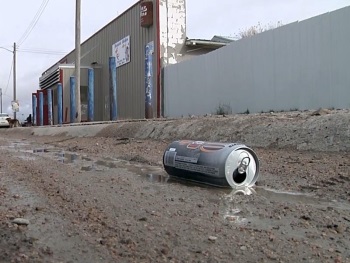 Does Paying Millions to Police a One-Horse, Four-Liquor-Store Town Make Sense?
Does Paying Millions to Police a One-Horse, Four-Liquor-Store Town Make Sense?
In the midst of the ongoing public health and safety disaster in Whiteclay, NE, the four local liquor store owners have been asked to re-apply for their license to sell alcohol by the Nebraska State Liquor Control Commission. A legislative hearing last October revealed that Sheridan County, wherein Whiteclay is located, did not have enough law enforcement to adequately patrol the town. As adequate law enforcement is a prerequisite for the issuance of an alcohol license, the State Liquor Control Commission is expected to decide if the stores will be granted the licenses in late February.
In the meantime, the problems at Whiteclay continue. The town of 12 residents and four liquor stores remains a major source for alcohol—and alcohol-related harm—for the adjacent Pine Ridge Reservation. Health and safety threats attached to rampant alcohol abuse in the town include:
- Public Intoxication
- Selling alcohol to minors
- Using food stamps to purchase alcohol
- Physical abuse
- Liquor stores exchanging alcohol for sexual favors
- Prostitution
In addition, there have been five unsolved murders in Whiteclay. In neighboring Pine Ridge,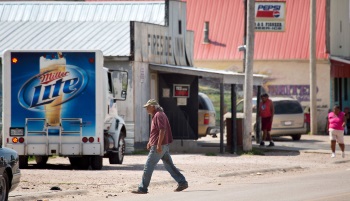 one out of four children suffer from fetal alcohol syndrome.
one out of four children suffer from fetal alcohol syndrome.
The costs for enforcement, investigation, prosecution, and incarceration are bourn directly by Sheridan County. It is estimated that the county spends $1.7 million a year patrolling Whiteclay—a third of the county's budget. The taxes generated by beer sales, on the other hand, total a meager $120,000 yearly. This math does not add up—it doesn’t benefit the county, it doesn’t benefit the state, and it doesn’t benefit the residents of Pine Ridge. It only benefits High Plains Budweiser and the owners of the liquor stores.
TAKE ACTION: stand with the people of Pine Ridge Reservation to oppose the licensing of liquor stores in Whiteclay.
Activists Encourage Nebraska Senator's Life-Saving Proposal, Legislation to Follow in 2017 - 10/26/16
by Michael Scippa
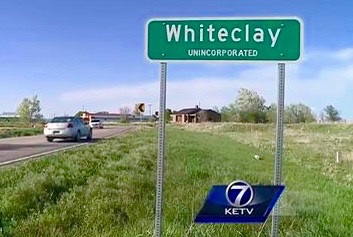 Alcohol Justice continues to provide media and strategic organizing support to the Oglala Sioux Tribe on the Pine Ridge Indian Reservation in South Dakota for their campaign to shut down the liquor stores across the border in Whiteclay, Nebraska.
Alcohol Justice continues to provide media and strategic organizing support to the Oglala Sioux Tribe on the Pine Ridge Indian Reservation in South Dakota for their campaign to shut down the liquor stores across the border in Whiteclay, Nebraska.
This past summer, Alcohol Justice initiated a successful Action Alert that generated over 635 letters to Nebraska State leaders asking them to support the work of State Senator Patty Pansing Brooks who declared that Whiteclay was a public health disaster for alcohol-related harm. Documented outcomes of liquor sales in the tiny town include widespread homelessness, alcoholism, sex trafficking, and alarming rates of fetal alcohol spectrum disorders. Senator Pansing Brooks is proposing legislation to deal with the illegal and illicit activity taking place at Whiteclay.
On October 11, 2016 the General Affairs Committee of the Nebraska Legislature heard testimony on LR567—an interim study introduced by Senator Brooks designed to examine and review the sale of alcohol in Whiteclay and the need for additional funding for law enforcement. Alcohol Justice drove three activists from Pine Ridge to participate in the hearing: Olowan Thunderhawk Martinez, Wambliwin Red Cloud, and former Tribal President Bryan Brewer. Alcohol Justice Board member Sonny Skyhawk also attended and testified, as did Alcohol Justice Advocacy Director Jorge Castillo.
Prior to the hearing all the people involved had a meeting with Senator Brooks. A strong and cordial relationship was established between Senator Brooks and the Pine Ridge activists. The group of participants agreed to continue to work together with the Senator to craft legislation next year. The hearing received extensive radio, TV, print and online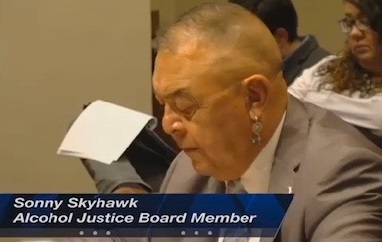 media coverage.
media coverage.
Earlier in the month, activist Olowan Thunderhawk Martinez was extradited to Nebraska to face allegations of criminal misconduct related to a Women's Day of Peace Rally at Whiteclay a few years ago. From all accounts it appears to be an attempt to criminalize her activism in order to neutralize the ongoing efforts to address the problems in the area. Alcohol Justice agreed to pay her bail and to assist with her attorney fees. As it turned out, being on bail allowed her to freely move in Nebraska and to testify at the hearing. Her extradition to Nebraska brought national media attention to her case and to the problems at Whiteclay.
In addition to legislation being proposed for 2017, due to a complete lack of enforcement capability in Whiteclay, the four liquor stores in the cross-hairs of controversy for their illegal practices will be forced by the Nebraska Liquor Control Commission to re-apply for their licenses to operate. Lack of law enforcement is grounds for denial of issuing alcohol licenses in the state.
Please TAKE ACTION to send your message of encouragement and support to Nebraska State leaders.
Breaking the Toxic Stalemate in Whiteclay! (UPDATED) - 9/16/16
Efforts Underway to Declare Alcohol Sales a Public Health Disaster

by Michael Scippa
Whiteclay, a Nebraska township of a dozen residents located near the border of South Dakota and the Pine Ridge Reservation, is home to 4 liquor stores that annually sell more than 4 million cans of high alcohol content beer and malt liquor to residents of the reservation who easily make the short walk across the state line. Alcohol sales and consumption have long been banned on the reservation, for good reason.
Generations of Lakota and Oglala Sioux tribal elders have protested against the culturally exploitative liquor stores. For the residents of Pine Ridge, one of the most economically disadvantaged communities in the U.S., 1 out of 4 children are born with Fetal Alcohol Spectrum Disorder, and 2/3 of the adult population are alcoholics. Yet ongoing petitions and presentations by Native American organizers and their supporters before the Nebraska Liquor Control Commission that seek to close these liquor outlets are stymied by the state laws making it legal to buy and sell alcohol within the state, and pressure from Big Alcohol to keep the profits rolling in.
Nebraska State Senator Patty Pansing Brooks is trying to break the impasse by declaring Whiteclay a public health disaster. Her June visit to the Nebraska township garnered television coverage, press attention in the Omaha World Herald, and even international press attention from the BBC and The Guardian.
Senator Brooks' next steps, as she prepares for a legislative interim study on Whiteclay's alcohol sales, will be to lead a group of Nebraska Senators, agency leaders, University of Nebraska Medical Center representatives and local activists on a high-level fact finding tour of Whiteclay and Pine Ridge September 27-28, 2016. She will then convene a formal public hearing at the Nebraska State Capital in Lincoln on October 11, 2016, to discuss findings and a multi-faceted approach to solving the core problems caused by the broken township of Whiteclay.
Sonny Skyhawk, actor, producer, activist, Alcohol Justice Board Member, and a proud citizen of the Rosebud Sioux Tribal Nation is among the speakers the senator has invited to testify at the hearing. There will also be 90 minutes of open testimony for anyone so moved to attend and wait for a turn at the microphone.
During her June visit, the Senator said, "In my entire life, I have never seen the depth of poverty, degradation, and inhumane treatment of a people as I saw in our beloved Nebraska at Whiteclay."
As news cameras accompanied the senator's visit, they captured visual evidence of soiled mattresses and shantytowns behind the liquor stores, public inebriation, prostitution and sex trafficking.
On her Facebook page, Senator Brooks wrote that she was especially dismayed to see baby shoes lying amidst the debris where people with alcohol addiction sleep. "We have a problem in Nebraska," she wrote. "We're obviously avoiding it and not dealing with it."
By declaring Whiteclay a health emergency, Senator Brooks seeks to add a state patrol substation within the township. Currently, it takes between 20 minutes and four hours for officials to respond to any 911 calls. She also hopes to tax the lucrative revenue stream of alcohol sales in Whiteclay to fund a health clinic (also known as "charge for harm"), tear down condemned and abandoned buildings (a tactic that other communities have used successfully to fight back against the "crack" cocaine epidemic), and bring broadband and other tools of economic development into the community.
Tribal residents are cautiously optimistic that real change may be on the horizon. It is urgent to keep the spotlight on this issue and break the toxic impasse of inaction.
This summer, more than 126 supporters of Alcohol Justice sent 635 messages demanding far-reaching change to:
- Pete Ricketts, Governor of Nebraska
- Robert Batt, Chairman, Nebraska Liquor Control Commission
- Mike Foley, Lt. Governor of Nebraska
- Judi M. Gaiashkibos, Executive Director, Nebraska Commission on Indian Affairs
- Courtney Dentlinger, Director, Nebraska Department of Economic Development
Update: Pine Ridge activist Olowan Martinez, charged during the 2013 Women's Day of Peace rally in Whiteclay, made her initial court appearance in Sheridan County Court, NE. Martinez was arrested September 13th on a criminal trespass charge during a nonviolent action to block the Dakota Acccess pipeline, and extradited to Nebraska. She has since been released on a $10,000 bond. More details here.
Now is the time to continue to pressure Nebraska officials! Make your voice heard -- TAKE ACTION to send your message of encouragement and support.
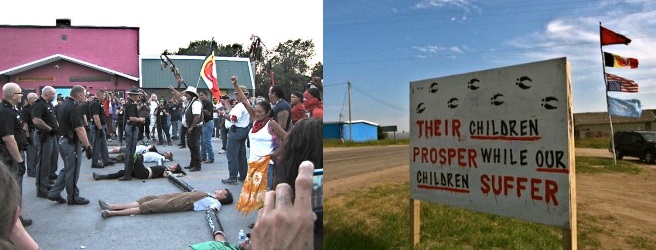
Help us hold Big Alcohol accountable for the harm its products cause.
| GET ACTION ALERTS AND eNEWS |
STAY CONNECTED    |
CONTACT US 24 Belvedere St. San Rafael, CA 94901 415-456-5692 |
SUPPORT US Terms of Service & Privacy Policy |


